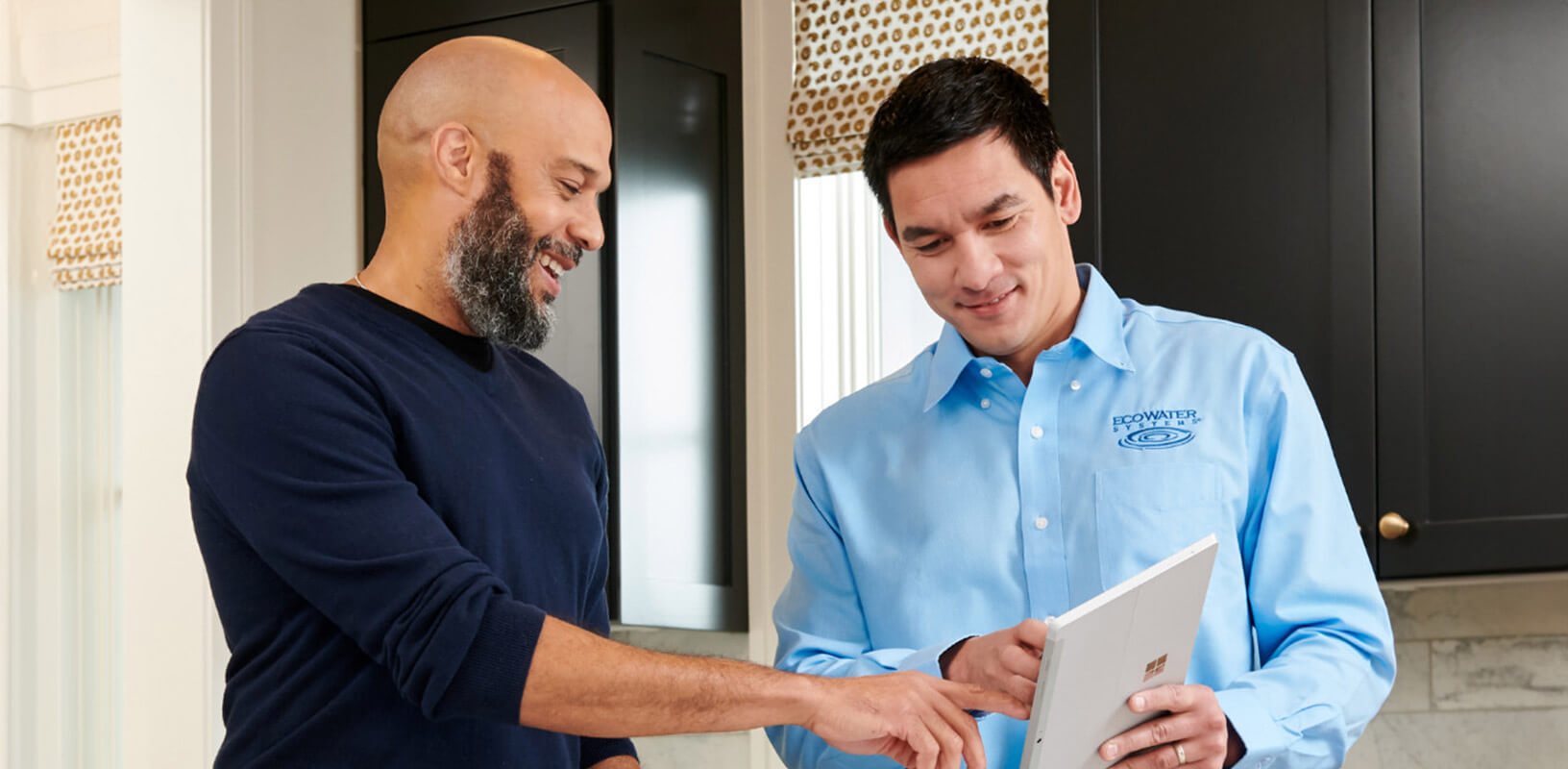Hard water may seem easy to ignore since you can’t actually see it. However, once you know the signs of hard water, including the havoc it can cause on your home and body, you’ll never want to experience hard water again.
If you’re a new homeowner, it may seem like there’s tons of details to track, so let’s keep it simple. Hard water contamination comes down to two things: what your water hardness is and, if your water is hard, whether you’ve got a working water softener that’s reducing hard water minerals such as calcium and magnesium to provide your home with soft water.

Do You Need a Water Softener?
Not everyone has hard water at home, but it’s estimated that about 85 percent of North Americans live in areas with hard water. If you are in the majority and don’t already have a softening system at home, continue reading to learn when you do need water softener.
How To Tell If You Need a Water Softener
If you have no softener at home but aren’t certain if your water is hard, the following signs may indicate you’re ready for a softening system:
- Soap won’t lather and leaves behind scum. Soap residue left on your body can clog your pores and lead to skincare problems, such as increased acne.
- Spotty dishes and glassware. Even if they’re clean, your dishes and glasses appear dirty, which can make hosting more challenging.
- Dry, irritated skin. A common hard water symptom indicating your skin lacks proper moisturization. Your skin may feel dried out and tight, leaving you more susceptible to bumps, razor burn and other skin blemishes.
- Dull hair, faded color. Your hair won’t be as healthy, making it dull. A dry scalp can also cause dandruff.
- Faded laundry that’s stiff. Clothing colors won’t be as bright, and towels and linens won’t be as soft.
- Low water pressure. Hard water minerals can build up in your pipes and water-using appliances over time, making them less efficient.
- Higher energy bills. Less efficient water-using appliances such as dishwashers and washing machines will impact your wallet, as you will need more energy to power everyday appliances throughout your home.
From soap not lathering correctly to higher energy bills, it’s easy to see why no one likes having hard water. Interested in learning more? Explore the effects hard water can have on your skin and hair.
When It Comes to Hard Water, Where You Live Matters
Most areas are impacted by hard water, but water hardness varies, based on geography and municipality. For example, much of the Pacific Northwest has soft water, in addition to parts of the South and along the East Coast. Most locations in the Midwest, however, have hard to very hard water. Plus, some municipal water is softened at the plant before it’s sent to homes for use.
The hardness of your water can be measured in grains per gallon (gpg). Your home water will fit into one of the following categories:
- Soft: 1-2 grains
- Slightly hard: 3 grains
- Moderately hard: 4-6 grains
- Hard: 7-10 grains
- Very hard: 11-14 grains
- Extremely hard: 15 or more grains
Use EcoWater’s Water Hardness Map of the USA to check your area for hard water.
When Do You Need a New Water Softener?
Having a broken water softener is as bad as not having one at all. Signs your water softener isn’t working include:
- Visible salt bridges. A thick crust of salt at the top inside your brine tank can cause blockages, disrupting the softening process. In many instances, these blockages can be removed and the softening system will work correctly again. However, a thick salt bridge could also be a sign your softener is ready for replacement.
- Old age. Most water softeners, if maintained properly, are designed to last up to 12 years. If your softener is older than that, or your water seems hard, based on the signs described above, your softener may need to be replaced.
- Spots and stains. If you see spots on dishes and glassware or chalky white residue around showerheads and faucets, your water is likely hard.
- Inconsistent water softness. In some instances water hardness can vary. This can be caused by seasonality or other fluctuations, such as how a municipality treats its water. It could also mean your softener is no longer operating at optimal efficiency.
- Strange noises. Unusual sounds can be an indicator your softening system isn’t working correctly. Grinding, squeaking and hissing are especially common.
The Next Move in Your Hard Water Journey
If you’ve got hard water, you have options and EcoWater is ready to help you explore them. Read on to learn about the paths you can take to enjoy the benefits of soft water.
1. Install a New Water Softener
Adding a water softener to your home for the first time can be tricky, especially if you don’t have any previous plumbing experience or the free time to learn. If you want expert, efficient service, hiring a professional is the way to go.
2. Upgrade or Repair Your Existing Unit
If your home has an old softening system that appears damaged or broken, consult an expert. Most water softeners are designed to last up to 12 years, and it may be that your softener requires replacement. Like installing a new water softener, this can be done yourself, however, it can be a lengthy process, especially if you don’t have any previous experience. Plus, you have to disconnect and haul away your old system.
3. Unrivaled Professional Expertise
When it comes to choosing a water softener and who can install it, you have a lot of choices. But none of them have more experience than EcoWater. In fact, EcoWater founder Lynn G. Lindsay Sr. was issued the first patent for an automatic water softener back in 1925—and the company he founded a century ago has been leading the way ever since.
If you’re ready to tap into that expertise, find your local EcoWater Pro to get started. They will begin with a free, in-home water hardness test and consultation to assess your family and home’s specific needs.

Get Answers From an EcoWater Dealer Near You
It’s easy to find an EcoWater dealer near you who can help solve and answer any of your water problems.
